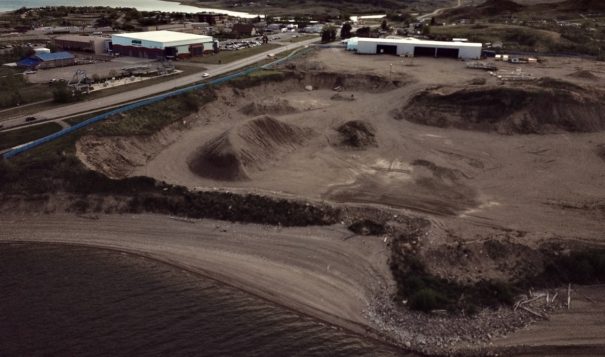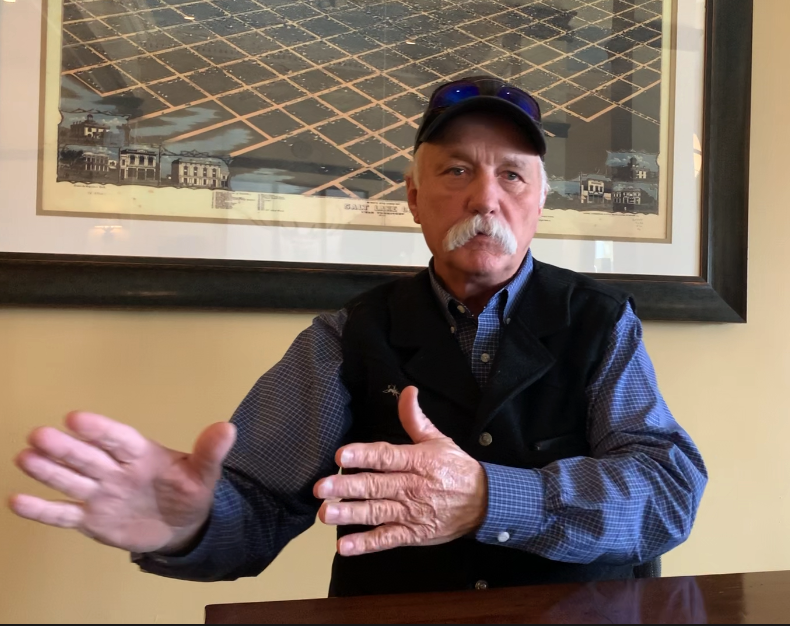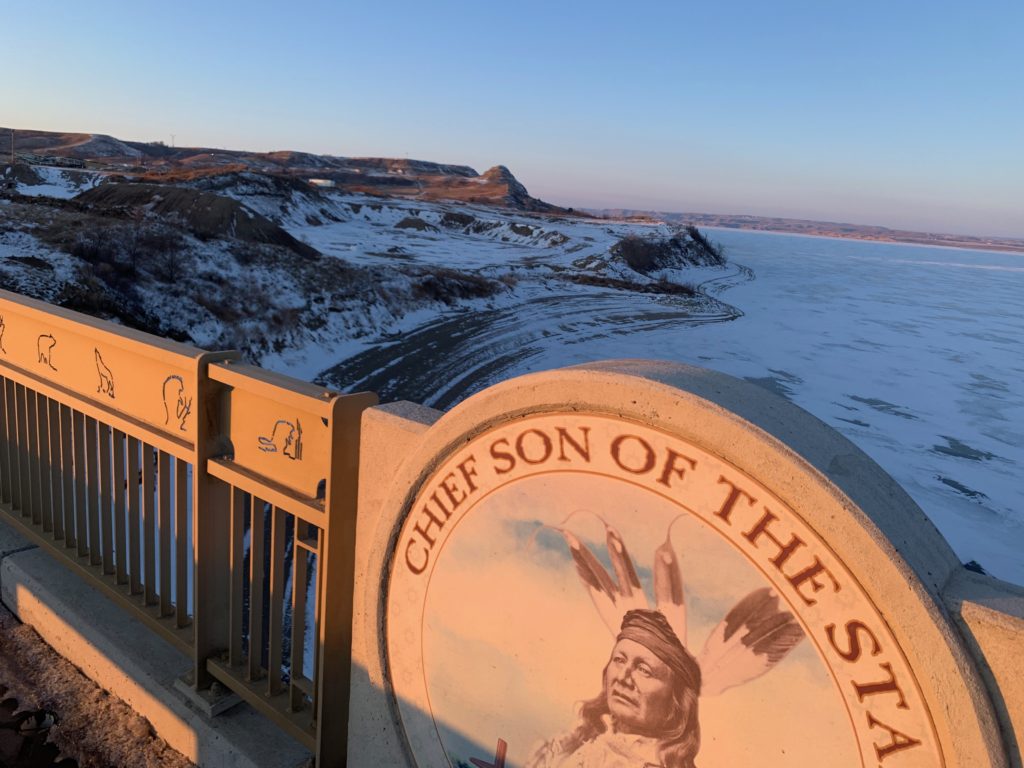North Dakota businesswoman sues tribe alleging it hid money in secret bank accounts to keep from paying her
 A massivie hole in the ground is what remains of Lakeview Aggregates, once the joint venture between Bird Industries and the Three Affiliated Tribes Four Bears Segement, which was doing business as the Four Bears Economic Development Corporation. PHOTO CREDIT/James Brugh
A massivie hole in the ground is what remains of Lakeview Aggregates, once the joint venture between Bird Industries and the Three Affiliated Tribes Four Bears Segement, which was doing business as the Four Bears Economic Development Corporation. PHOTO CREDIT/James Brugh
A North Dakota businesswoman is suing an area tribe on allegations it hid money in secret accounts to keep from paying her millions of dollars she says she earned in a business deal with the Three Affiliated Tribes Four Bears Segment.
Laura “Lori” Bird, owner of Bird Industries, is suing the Three Affiliated Tribes and its Four Bears Segment for $147 million she believes she is owed from a gravel pit business. She signed a joint agreement with Councilman Frank Grady, elected from the Four Bears Segment, which later did business as the Four Bears Economic Development Corporation.
The April 2015 joint business venture allowed for gravel mining and concrete sales. In June that year, the venture became known as Lakeview Aggregates. It ended in May 2017 with a $320,000 buyout to Bird after the business was predicted to “inevitably fail”,” according to Bird’s demand for arbitration. Her claim was accepted by the American Arbitration Association in October 2019.
Meanwhile, Bird said a legal review of her case is long overdue. “I’m full of gratitude that I made it this far,” Bird said. “I turned to so many people who said, ‘You can’t sue a tribe.’” Tribal Chairman Mark Fox has declined to be interviewed about the multimillion-dollar dispute over the financial management of a tribal natural resource.
The Three Affiliated Tribes, also known as the Mandan, Hidatsa and Arikara Nation, responded to the claim by filing a motion to dismiss last fall. Arbitrator Karen Klein, who is overseeing the dispute, ruled against the motion on June 25, writing that the “Tribe’s arguments are largely unsupported by evidence.”
Klein described the contractual dispute as one in which “Revenue from the project was supposed to be deposited in a particular bank account, but as alleged by Bird, tribal representatives secretly set up other bank accounts to hide revenues from Bird.”
Once Bird learned of alleged hidden bank accounts, she filed an arbitration claim after her lawyer could not renegotiate terms of her contract with Fox. “I am just looking for peace so I can carry on and replace the pain and suffering I’ve endured after being bullied by my own tribal leaders. It’s their job to protect us as tribal members,” said Bird in an interview.

Gravel Pit
A drive west along Highway 23 outside of New Town, N.D., leads to Lake Sakakawea and the Four Bears Bridge. A left exit from the bridge leads to the sprawling Four Bears Casino complex. A turn in the opposite direction leads to the remnant operation of Lakeview Aggregates, the tribe’s mining area that abuts Lake Sakakawea.
Bird, a citizen of the Three Affiliated Tribes who lives in Brookings, S.D., became involved with the mining operation on the Fort Berthold Reservation through her business. In 2003, she founded Bird Industries. In 2011, she joined thousands of entrepreneurs from across the country who sought business deals as part of North Dakota’s lucrative Bakken oil shale boom.
The reservation sits atop the Bakken Shale formation. The state, the tribe, multi-billion dollar oil corporations and start-up companies all together have reaped billions of dollars from oil-related sales. Oil production in the Bakken has catapulted North Dakota to become the second largest oil producer in the United States.
While Bird was operating her oil field service business, she said she was contacted by a representative of the Four Bears Segment, one of six political districts on the Fort Berthold Reservation. In a sworn statement, she said she’d been asked to help find an investor for a hotel to be built across the highway from the Four Bears Casino.
Initial site preparation for the hotel led to the discovery of a large deposit of high-grade aggregate minerals that could be used for gravel and concrete. Plans were switched from immediately building the hotel to mining aggregate materials.
What allegedly happened next is described in sworn statements from three people regarding secret bank accounts provided to the arbitrator in affidavits dated May 26:
Revenue from Lakeview Aggregates was supposed to be split with 40 percent going to Bird Industries, as well as 49 percent from a concrete division, she said in a sworn statement. Bird said she opted out of a 50-50 split because she chose to contribute 10 percent of her profits to the Four Bears Economic Development Corporation. “I agreed to the lesser percent of net profits believing that by doing it would greatly benefit the people of my tribe,” wrote Bird in her sworn statement.
“I was so happy and in shock, I fell to my knees and cried when I got off the phone. It literally was the best day of my life. By that time, we had been told by so many lawyers a tribe can’t be sued and they didn’t want my case.”
Laura “Lori” Bird after learning federal agents were investigating Lakeview Aggregates
Furthermore, she said, “both parties agreed to contribute 50 percent of the capital needed for expenses until the business could survive on its own…I financed both Bird’s 50 percent share as well as the share my joint venture partner had agreed to pay.”
Bird also wrote that in early 2018 she learned from Brandon Bentley — an operator of the Four Bears gravel pit who worked under a separate contract — how money had been hidden from her as a joint business owner. “He told me that Tribal Councilman Frank Grady and his staff had set up numerous undisclosed bank accounts in another bank in New Town and also in other banks around the country.”
Bird said Bentley told her sales from gravel and cement were deposited into the other accounts, and not the Wells Fargo joint venture account. “I was shocked to get this news from Mr. Bentley,” she wrote.
Jacy Bird, vice president of operations for Bird Industries, wrote in a sworn statement that at least one alleged secret account was set up at Cornerstone Bank in New Town, N.D. in the name of Lakeview Aggregates. In early 2018, Bird Industries received some “214 double-sided documents purporting to be bank statements and cancelled checks from Cornerstone Bank in New Town,” Jacy Bird wrote.
“These statements were never disclosed or received by Bird Industries prior to the buyout of Bird Industries,” wrote Jacy Bird, who is Lori Bird’s son. In addition to the bank statements, Bird Industries also received a bank spreadsheet reporting outgoing wire transfers from Cornerstone Bank totaling $3.4 million from September 2016 to August 2017, he wrote.
Kirt Bailey, president of Focus Energy – a gravel pit operator – wrote in his sworn statement: “My name was put on the Lakview account at Cornerstone Bank as one of the persons authorized to sign checks and receive information pertaining to the account. I was not receiving any, so, I first asked Councilman Grady for copies of the bank information but was not provided any.” Bailey said Grady terminated the Focus Energy contract on Aug. 25, 2017, shortly after his inquiry.

In the November 2019 motion to dismiss, the Three Affiliated Tribes provided three main reasons Bird’s arbitration claim should end.
First, the tribe asserted Three Affiliated Tribes Councilman Frank Grady, then an elected official of the Four Bears community, lacked authority to sign an agreement on behalf of the tribe. Second, the tribe argued that it couldn’t be sued because its sovereignty provided immunity from suit. Third, the Fort Berthold Economic Development Corporation also “enjoys immunity” and has not waived it, the tribe contended.
After arbitrator Klein rejected the motion to dismiss in June, attorney Peter Breuer of the Fredericks Law Firm, who represents the tribe, filed another motion asking Klein to reconsider her action. In his motion, Breuer wrote that even though the commercial arbitration rules do not provide a procedure for reconsidering a motion, he said, “it would be appropriate to borrow from other sources” – namely, federal rules governing court procedures.
Entrepreneurial Spirit
Entrepreneur Bird founded Bird Industries in 2003 by first selling school and office supplies. She then expanded in 2011 to include oil field related services during North Dakota’s Bakken oil boom. Then a single mother, she said she endured the hardship of working in North Dakota away from her home in Brookings, S.D., where she was also raising her children with the help of her parents and other family members.
While in North Dakota, she was happy to work in her father’s ancestral homelands. She entered business agreements with other partners for about a year before taking full control of her business operations. She said her credit, capital, and assets built through Bird Industries allowed her to help finance work with the Four Bears Segment.
Business tax records show Bird Industries earned $23.8 million in gross profits from 2013 to 2015. It owned trucks, trailers and other equipment. When former Three Affiliated Tribes Chairman Marcus Levings, now a Four Bears Segment employee, sought her help in 2015 for the hotel project, she was ready for business. “I invested tens of thousands of dollars with no contribution from the tribes or any of its sub-entities,” wrote Bird in her affidavit.
While she developed her business, she pursued Small Business Administration 8A certification, a program that benefits businesses owned by socially and economically disadvantaged individuals, by providing them with advantages in obtaining federal government contracts. Her business became certified on March 24, 2016.
Bird believed her certification could help business at the gravel pit, but instead, her partnership with the Three Affiliated Tribes Four Bears Segment – which also did business as the Four Bears Economic Development Corporation — would lead to the demise of Bird Industries.
Forced Buyout
After gravel pit operations began in June 2015, Bird said, the joint venture quickly faltered. “Months later, I was informed by Jolene Lockwood, one of Frank Grady’s staff, that me and my team were being removed from all day to day operations at the venture. Soon after, I was told by Jolene Lockwood that I was being removed completely from the Lakeview Aggregate’s project,” wrote Bird.
“By that time, I had lost my entire staff. I was losing my business and my home, I was in dire need. I had worked so hard to build my company for over 10 years.”
Laura “Lori” bird said in a May 26 affidavit
If late spring seemed bad, by fall 2015, the joint business partnership had soured and became a financial drain. Despite cash infusions on a monthly basis, Bird said, she earned little to nothing on the mining operation. During this time, Bird had also ended her marital engagement to Three Affiliated Tribes Councilman Fred Fox.
Bird had made 12 draws on her Bird Industries banking account from May 2015 to July 2016 totaling more than $3 million, according to records filed in the arbitration proceeding.
By now, the gravel pit operation had crushed her, Bird said.
Because she was losing money on the gravel pit, she fell behind on making payments to subcontractors. She was also hospitalized in November that year as her own health began to fail.
With no money being earned from the joint venture, Bird was not paid, nor could she pay bills. “With no reimbursement of the money and equipment I had invested in the project and with the number of lawsuits against my company, I went to my Councilman Fred Fox to discuss the situation,” Bird said in her sworn statement.
“By that time, I had lost my entire office staff. I was losing my business and my home, I was in dire need. I had worked hard to build my company for over ten years and it now appeared that this was all lost,” she said in the May 26 affidavit.
She would eventually be sued by the U.S. Interior Department’s Bureau of Indian Affairs for defaulting on a small business loan of $680,000.
Crushed
Her joint venture operation came to a grinding halt in February 2017 when attorney Damon Williams, who represented tribal interests, proposed a buyout to Bird. He drafted an offer of $5,000. Bird said she put millions of dollars into the venture and refused the low buyout. “I walked out of that meeting because of the insulting offer,” according to her affidavit. Later the same day, the buyout offer increased to $25,000 and then $75,000.
On April 6, 2017, Bird stated in her affidavit, Councilman Fred Fox – who is not related to Chairman Mark Fox — helped her get on the agenda of the Three Affiliated Tribes Natural Resource Committee hearing in Bismarck, N.D. She discussed her buyout with committee members. She said she didn’t want to give up and asked to remain in the joint venture.
The Tribal Councilmen who attended that Natural Resource Committee meeting in April included Grady – who had signed the joint venture agreement with Bird Industries – Fred Fox and Randy Phelan. During the meeting, Grady insisted Lakeview Aggregates was a losing venture, Bird said. “He assured the group it was not making any profit, an assertion I later learned to be false,” said Bird in the affidavit.
In May 2017, attorney Williams – again representing tribal interests – made a new closeout offer. The final buyout increased to $320,000. With business debts mounting and what seemed to be a joint venture failure, Bird agreed to accept the money.
“I felt I had no other choice,” she said in an interview. “I had no money for a lawyer. And they knew that.” On May 30, 2017, Chairman Mark Fox and treasurer Mervyn Packineau signed the $320,000 check made personally to Bird from a Three Affiliated Tribes bank account.

Revelation
Nearly four years after she entered into the joint venture contract, Bird’s chances of recouping any business losses seemed to disappear. But, in late January 2019, Bird said, she received a call from a federal agent. The agent asked to interview her about Lakeview Aggregates. She was relieved to learn the Three Affiliated Tribes Four Bears Segment business was part of a federal investigation.
“I was so happy and in shock, I fell to my knees and cried when I got off the phone,” she said in an interview. “It literally was the best day of my life. By that time, we had been told by so many lawyers a tribe can’t be sued and they didn’t want my case. My message from my Creator kept telling me to keep going.”
Refueled with new hope and unhappy with the forced buyout, Bird began to look for an attorney to help recover the millions of dollars she said she lost in the joint venture. She said she didn’t know how difficult it would be to find a lawyer to take on tribal leaders of the federally-recognized Mandan, Hidatsa and Arikara Nation.
At the time, the tribe was one of the wealthiest in the country benefiting from billions of dollars in tax revenues and oil royalties from the Bakken shale fields.
Bird said she contacted nearly 40 attorneys, none of which agreed to take her case. Nearly down on her luck, she was directed to Bismarck, N.D. attorney Irvin Nodland. He reviewed her buyout agreement, which included an arbitration clause. He agreed to represent her.
Within four months of her May 2017 buyout with the Four Bears Segment, the Three Affiliated Tribes Tribal Business Council passed a resolution in October that year to dissolve the Four Bears Economic Development Corporation. The council members noted in the resolution that the Four Bears Segment “failed to operate” under its bylaws and general good business practices. It was also stated that the corporation’s “existence is no longer necessary or required.”
In November 2018, voters in the Four Bears community voted Councilman Frank Grady out of office. He was replaced by Councilwoman V. Judy Brugh. “When I took office I had the gravel pit shut down completely and the current administration has had to pay a lot of outstanding bills because of the previous acts of Mr. Grady,” said Brugh in an email. “Chairman Fox has been very accommodating in seeing this through.”
For now, all that’s left today of the aggregate operation — once a whirlwind of activity — is a multimillion-dollar legal claim and a massive hole in the ground. Arbitrator Klein has yet to decide on whether she will consider the Three Affiliated Tribes second attempt to dismiss Bird’s arbitration claim.
Jodi Rave is the publisher of Buffalo’s Fire, an online news site dedicated to freedom of the press in Indian Country. Jodi is a Harvard Nieman Fellow and award-winning journalist and column writer.
